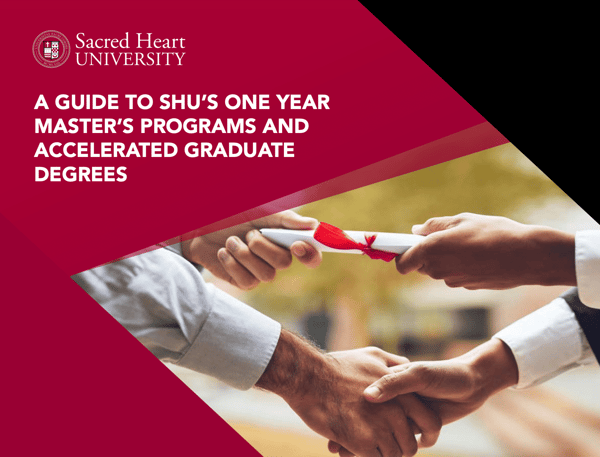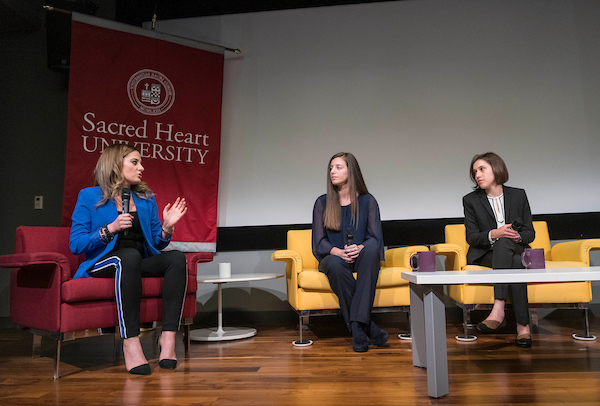Accelerated graduate degree programs are a great way to get a master’s degree in less time than traditional degree programs. However, as with many good things, there’s a trade-off. While an accelerated master’s degree helps you earn a master’s degree in as little as a year, it requires commitment to a condensed workload that could be overwhelming for some people.
If you’re considering grad school, you might be asking yourself, “are accelerated master’s programs worth it?” If so, this blog is here to help. We’ve put together some of the pros and cons of accelerated degree programs to help you decide if the benefits outweigh the disadvantages.
The Challenges of an Accelerated Master's Degree Program
For many students the choice to pursue an accelerated master’s degree is a no brainer, however that’s not the case for everyone. The work and time commitment required to successfully complete an accelerated degree can be a setback for some students, either because they lack the free time or they’re not ready to commit to such an undertaking. Before you decide to go for an accelerated degree, consider these three challenges.
You'll have a heavy workload in a condensed time frame
Perhaps the biggest challenge of an accelerated program is the workload. Because you’re essentially condensing two years of work into one year, you can expect to have more work to do outside of class than you might have in a traditional program. Ultimately, that means you’ll have less time for things that aren’t related to school.
You'll have trouble working full-time
As we mentioned above, an accelerated degree requires you to do more work in less time. While it’s not true of all programs, the workload often makes it hard for students in accelerated programs to maintain a full-time work schedule while balancing class and homework. If you can’t afford to cut your work schedule to part time, you might be better suited for a traditional master’s degree program.
You'll have to commit to a program in advance (sometimes)
If you want to start your master’s degree during your undergraduate years, you’ll have to commit early in your bachelor’s program (though some accelerated programs are designed so that you don’t have to commit fully in your undergrad). This means you’ll have less time for degree and career exploration than your peers who may not declare a major until after their sophomore year, but of course you get the added benefit of graduating with a master’s degree in less time.
The Benefits of an Accelerated Master's Degree Program
Whether your chosen career path requires a master’s degree or you just want to stand out amongst your peers in the job market, an accelerated master’s degree can get you out of school and into the workforce. That’s why an accelerated program is a great option for many students! Here’s why you should consider a fast-track degree program.
You'll spend less money on tuition
Tuition rates are rising every year, and it’s no secret that the longer you spend in school the more money you’ll spend on tuition. A fast-track degree can reduce your overall cost of education by shaving up to two years off of your time in school. If the cost of graduate school would otherwise be a barrier, this can give you more options.
You'll enter the workforce with a graduate degree in less time
A traditional graduate degree can take as many as three years to complete, depending on your program. An accelerated degree lets you enter the workforce with a master’s degree in as little as a year. That means you’ll start working and earning up to two years sooner, putting you years closer to reaching big financial goals (like paying off your student loans!).
Not only will you start earning sooner, you might actually earn more! According to the U.S. Bureau of Labor Statistics, education pays. The more education you have, the more likely you are to earn a higher salary — even in the challenging post-pandemic economy.
You'll keep your edge
Taking time away from school after your undergraduate degree can be beneficial for many reasons, but it can also make it harder to go back. Accelerated programs allow you to flow directly into a graduate degree without losing your focus. Especially if you know a master’s degree is required for your field, an accelerated program is a no-brainer.
How to Start an Accelerated Master's Degree Program
As the name suggests, accelerated programs allow you to earn a master's or similar degree at a faster pace. To take advantage of a fast-track degree program, you'll need to do some careful planning and consideration.
Depending on your college or university and the degree you want to pursue, you can start your accelerated master’s degree as part of your undergraduate studies or begin at the graduate level.
At the undergraduate level, students earn credits for their undergraduate program and graduate degree simultaneously and will graduate with two degrees in less time than if they were to pursue each degree separately. These degree programs are often also called one-year master’s programs, +1 or +2 programs.
If you want to start at the undergraduate level...
- You should make sure the undergraduate major and master’s degree you’re interested in are eligible for a one-year master’s degree program before committing.
- You’ll need to work closely with your undergraduate advisor to ensure your courses are taken in the correct sequence.
- Depending on the program you choose, you’ll need to declare your intent to participate in an accelerated program early in your undergraduate career.
If you’ve already earned your undergraduate degree or you’re too far into your bachelor’s to add an accelerated program, you can start right at the graduate level. This requires less planning in advance and may even yield more program options than combination undergrad/grad programs.
If you want to start at the graduate level...
- You must already have a bachelor’s degree or higher from an accredited college or university.
- Depending on the program, you may need to take the GRE or other qualifying graduate exam.
Take advantage of the Accelerated Master's DEgree Programs at SHU
If an accelerated degree program sounds like the best way for you to earn a master’s degree, Sacred Heart University is here to help. We offer 17 fast-track degree programs in a variety of fields — including a master of business administration (MBA) and a master of social work (MSW)! Even better? Nearly all of our accelerated master’s degree programs allow you to earn a Master’s degree in just one year, instead of two or three.
Ready to start exploring how SHU’s accelerated degree programs can help you reach your goals? Download A Guide to SHU’s One Year Master’s Programs and Accelerated Graduate Degrees to learn more about the benefits of an accelerated degree and the programs offered at SHU.









